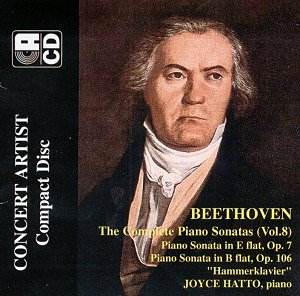AVAILABILITY
www.concertartistrecordings.com
This is the first of
Joyce Hatto’s complete Beethoven cycle
that I’ve heard. It has reached the
mighty Hammerklavier and coupled
with it is the early Op. 7, prompting
speculation as to how Hatto would approach
these two profoundly different works.
The E flat Sonata opens well in those
Fanfare thirds with Hatto’s chordal
playing tending to a distinctly bass
orientated sonority. She is lithe, alert
in passagework, and constantly purposeful.
It’s noticeable that in comparison with
an older player, such as Kempff, she
takes a much more linear view. Kempff
makes more of the inherent potential
for contrast (such as the Fanfare theme
and the ensuing contrastive material)
whilst Hatto tends to absorb them. Equally
the older player exploits greater colouristic
volatility, with humorous pointing as
well; Hatto is more engaged on architectural
sureties and in coalescing and cohering
the movement. In the Largo she sounds
quite brusque, abruptly cutting off
her chords, clearly detecting in the
music abrasive qualities not best served
by generalised expression. Her playing
here is straight in the best sense though
I must say that I find Kempff’s narrative
tension is stronger and he is the more
explicitly touching. The non-Scherzo
Allegro is well characterised, though
I miss the stabbing bass accents of
more interventionist readings and the
gradual but inexorable screwing up of
tension. If one were to describe Hatto
and Kempff’s Rondo finale from its indication
one should say his is more grazioso
and hers more Poco Allegretto. Once
again Kempff employs greater dynamic
gradients and accents whilst vesting
the music with more weight and colour.
But Hatto’s is a convincingly unanimous
reading.
I’d hesitate to call
her Hammerklavier anti-heroic;
perhaps anti-grand would be a better
characterisation. Nevertheless the clarity
of her passagework is lordly in its
finesse and articulacy and I sense a
thoroughly up to date sensibility at
work, cognisant of all types of performance
practice whilst being subservient to
none. As with the earlier sonata she
makes limited contrastive gestures in
the slither of the Scherzo – and whilst
there is little cragginess here she
always makes sure architectural sense.
The stormy trio in B flat minor is good,
not visceral and the presto section
pushes ahead well. In the great Adagio
sostenuto one hears once again her Beethovenian
imperatives – or, at least, the imperatives
as they seem to me in these works. Her
fingerwork is very special and her sense
of recreative cogency highly developed.
She employs weight of tone with subtlety
but doesn’t seek to employ a huge dynamic
range – it’s more a question of gradation
of tone linked to a powerful technique
and I wasn’t aware of any undue pressures
on that formidable equipment of hers.
There is therefore in her performance
something of an absence of overwhelming
tumult – this is a more inward and conciliatory
approach – as is confirmed in the finale
where the fugal entry points are perfectly
clear and the compelling drama is played
out with technique to spare. One avoids
in her performance some of the philosophic
extremes cultivated by someone like
the extraordinary Ernst Levy but also
the cumulative expression of such as
Kempff.
The recording level
is good – nothing is obscured – and
the fine notes are by a fellow contributor
to this site, William Hedley. I’d be
very interested to hear more of Hatto’s
Beethoven.
Jonathan Woolf
see also JOYCE
HATTO - A Pianist of Extraordinary Personality
and Promise Comment
and Interview by Burnett James
The
entire Concert Artists catalogue is
available through MusicWeb
